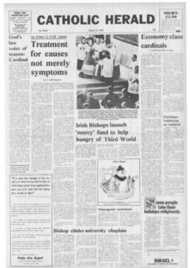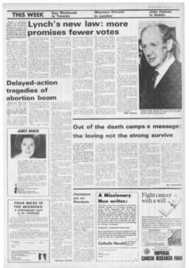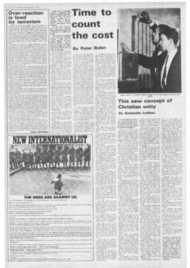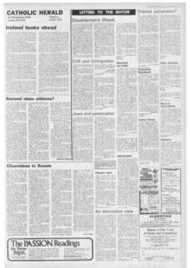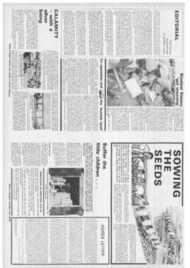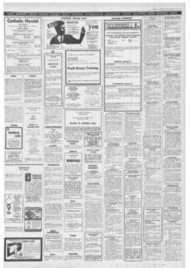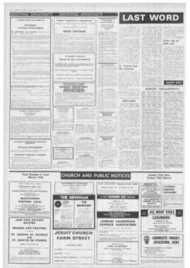Page 4, 9th March 1973
Page 4

Report an error
Noticed an error on this page?If you've noticed an error in this article please click here to report it.
Tags
Share
Related articles
Church Seeks Laymen's Ideas
Nolan: Getting It Right
Suspicious Silence On Catholic Education
Choir School Reprieved
Threat Of Apathy To Religious Education
Time to count the cost
By Peter Nolan
Today costs of Catholic schools in England and Wales are higher than they have ever been. The word "crisis" is being used to conjure with at parents' meetings and in church pulpits throughout both countries.
Yet the exact extent of this crisis on a national basis in the terms that count is difficult to establish of ficially. Our cards for negotiating a new deal for Catholic schools — which must of course include all other Church schools — may or may not be poor. I wonder, however, whether the cards need to be played quite so close to the chest.
My own estimate of the cost of schools to Catholics in England and Wales is £40,000,000 a year.
Some cost. Some crisis.
But the Department of Education and Science this week took it calMly. A spokesman said: "The Department arc keeping continually under review the problems of voluntary schools. But there is no specific development at the present time."
Less calm are the parents, teachers and priests to whom I have been talking about the difficultieS Catholic tax-payers in England and Wales face in protecting their right to the education of their choice. for their children.
These talks have not provided u definitive survey. Nor were they designed to. Rather I hope to elicit from readers of the Catholic Herald their views on the whole subject of the past heroic, the pre sent difficult and the future indefinite of Catholic schools in Englund and Wales.
Not. you will note, Scotland. There a different system, which will be discussed in a subsequent Special Report, obtains. The question of Whether an attempt should be made to negotiate a similar deal for England and Wales must wait upon that Special Report.
Meanwhile, to begin at grassroots level 1 quote from the Oratory Parish Magazine. the current issue of which gives a succinct summing up of the situation in the key diocese of Westminster: "Although the Government provides an 80'5b grant for school building, the Catholics of the diocese still have to find the other' 20%, and there are 268 schools. In 1971 the central school fund had an income of £367.000. but ;titer paying interest on the ac
cumulated debt and other essential expenses only 1107,000 was left for school building. As this was not enough the Diocese had to borrow a further 1413,000, and so in 1972 the interest due was about £35.000 more.
How, it may be asked, has this catastrophic situation come about? There are three reasons: (1) The income of the school fund has never been sufficient: (2) No grant was available for Primary schools before 1967, but, the Diocese could not wait and so it built these schools by going into debt: (3) The effects of inflation. The Diocese naturally has to coordinate its building plans with the local Education Authority but these are decided several years ahead. The 1976 programme has to he decided this Spring. But if the Diocese has to borrow new
sums in the years ahead by 1976 the whole income of the school fund will be committed to interest and repayment of debts, and the annual programme of building will have to stop. That is why it is essential to increase the income of the central school fund now.
To continue at grassroots level it was St. Margaret's Parish Council, Twickenham which published a report which said: "The fundamental problem in our view is not how to pay for Catholic schools, but how best to provide for the religious formation of Catholic children."
Pointing out that only six out of ten Catholic children attend Catholic schools, they urge that -the Christian formation of the young should he organised as a comprehensive programme of which Catholic schools are only a
pa
St. Margaret's suggested that a professional study needed to be made of the effectiveness of various methods of Christian formation. Later five London priests working with schoolchildren sup ported the need for such a study.
One of these priests, Fr. Kenneth McCabe, whose work has helped transform Cardinal Manning School, Ladbrooke Grove. London, into a communi ty centre, is shortly to meet Cardinal Heenan and members of the Westminster Education Commission.
On another level, parents have failed to find a clear Church policy on the development of comprehensive schools. Mr. Basil Cousins is chairman of the New Malden, Surrey. Parents and Electors Association. Mr. Cousins said:
"I am a member of the parents association of the Ursuline Convent, Wimbledon. We could get no definite statement on Catholic policy on comprehensives when faced with the problem. Archbishop Beck of Liverpool, president of the National Education Commission has asked parents of differing opinion on the comprehensives issue to join the working party now studying the problem for Liverpool city.
Mrs. Sabin Bacon. a lecturer at Kingsway College of Further Education, London, who has two children at St. Theresa's Primary school, Finchley, said she was "appalled" at the approach adopted by the officials of the Diocesan Education Commis sion.
Mr. Peter Carney, General Secretary of the 5,000 strong Catholic Teachers Federation, said: "It is our firm policy that there should be a place in a Catholic school for every child whose parents want him there.
"Catholic teachers feel parents should he involved more and more in the real running of the school system."
Last month Birmingham Education Commission took steps to involve parents as governors and managers. he said. Fourteen parents from each of the 14 diocesan area education committees are to be brought into the Diocesan Commission.
In neighbouring Wolverhampton 600 parents recently attended a meeting at St. Edmund's Comprehensive School, Compton Park. to discuss how communication between parents and those running Wolverhampton schools could be improved.
In Liverpool. another key diocese, Bro. Alban. Headmaster of De La Salle Grammar School, West Derby, said at the school's annual prizegiving last week: "I estimate that inflation, since our revised grant five years ago, has cut our per capita grant from the local 'authority by 30 per cent.
"I am not being melodramatic when 1 indicate that there is a serious crisis in the school with regard to books, stationery, materials and equipment. The allowance we receive for each additional sixth-former is not enough to buy the books he needs for the course."
The school, being an aided grammar school, receives a capitation allowance for its 660 boys from the Liverpool Education Committee to cover books stationery and equipment. The same scale applies to all maintained schools.
Mr. Ronald Brech, a statistician and former member of the Laity Commission, thinks there is certain to be an increasingly heavy burden on Massgoers.
Mr. Brech believes the Catholic approach for more state money should he far different from the tentative and secretive negotiations of the past. "We are now II per cent of the population, the situation is different to when we were only five per cent. We cannot stay still for 20 years."
Next month the Bishops' Conference hope to receive their report on the theology of education in the light of the teaching of the Second Vatican Council. This is being prepared by the Education Commission.
Catholics in England and Wales in their turn can only hope that mixed with the theology there will be a certain amount of realistic appraisal of the present cost effectiveness of the Catholic schools' system.
blog comments powered by Disqus


